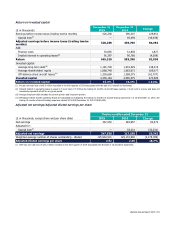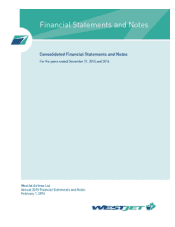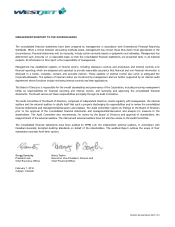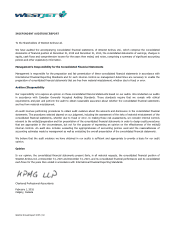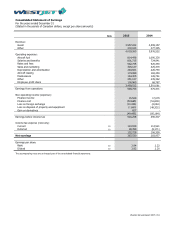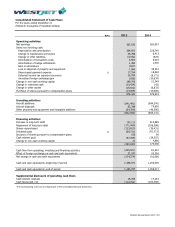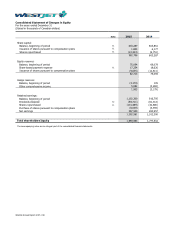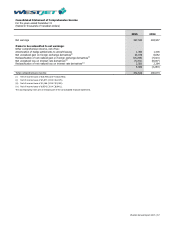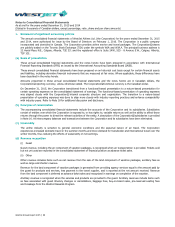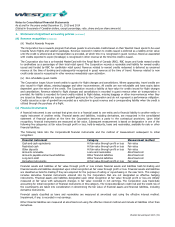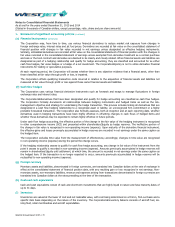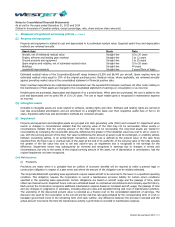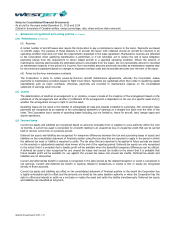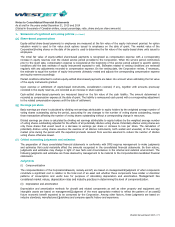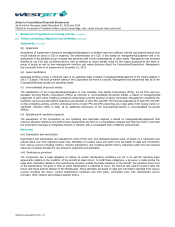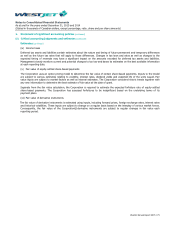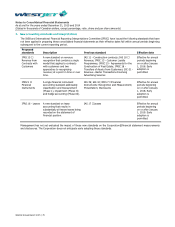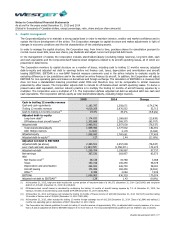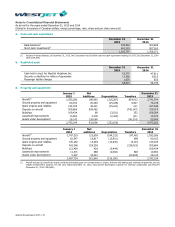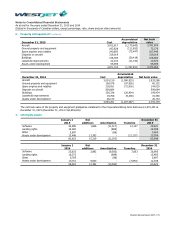Westjet 2015 Annual Report Download - page 71
Download and view the complete annual report
Please find page 71 of the 2015 Westjet annual report below. You can navigate through the pages in the report by either clicking on the pages listed below, or by using the keyword search tool below to find specific information within the annual report.
Notes to Consolidated Financial Statements
As at and for the years ended December 31, 2015 and 2014
(Stated in thousands of Canadian dollars, except percentage, ratio, share and per share amounts)
WestJet Annual Report 2015 | 69
1. Statement of significant accounting policies (continued)
(d) Revenue recognition (continued)
(iii) WestJet Rewards Program
The Corporation has a rewards program that allows guests to accumulate credits based on their WestJet travel spend to be used
towards future flights and vacation packages. Revenue received in relation to credits issued is deferred as a liability at fair value
until the credit is utilized and air transportation is provided, at which time it is recognized in guest revenue. Revenue associated
with credits expected to expire (breakage) is recognized in other revenue at the time the credit is issued.
The Corporation also has a co-branded MasterCard with the Royal Bank of Canada (RBC). RBC issues and funds reward credits
to cardholders as a percentage of their total retail spend. The Corporation records a receivable and liability for reward credits
issued and funded by RBC for cardholder retail spend. Revenue related to reward credits redeemed is deferred as unearned
revenue at the time of booking and subsequently recognized in guest revenue at the time of travel. Revenue related to new
credit cards issued is recognized in other revenue immediately upon activation.
(iv) Non-refundable guest credits
The Corporation issues future travel credits to guests for flight changes and cancellations. Where appropriate, travel credits are
also issued for flight delays, missing baggage and other inconveniences. All credits are non-refundable and have expiry dates
dependent upon the nature of the credit. The Corporation records a liability at face value for credits issued for flight changes
and cancellations. Revenue related to flight changes and cancellations is recorded in guest revenue when air transportation is
provided. No liability is recorded for travel credits related to flight delays, missing baggage or other inconveniences when they
are issued as these credits are issued as goodwill gestures by the Corporation and do not represent a performance obligation.
Credits issued as a sign of goodwill are recorded as a reduction to guest revenue and a corresponding liability when the credit is
utilized through the purchase of a flight.
(e) Financial instruments
A financial instrument is any contract that gives rise to a financial asset to one entity and a financial liability to another entity or
equity instrument of another entity. Financial assets and liabilities, including derivatives, are recognized in the consolidated
statement of financial position at the time the Corporation becomes a party to the contractual provisions. Upon initial
recognition, financial instruments are measured at fair value. Subsequent measurement is based on designation in one of the
following five categories: at fair value through profit or loss, held-to-maturity, loans and receivables, available-for-sale or other
financial liabilities.
The following table lists the Corporation’s financial instruments and the method of measurement subsequent to initial
recognition:
Financial instrument
Category
Measurement method
Cash and cash equivalents
At fair value through profit or loss
Fair value
Restricted cash
At fair value through profit or loss
Fair value
Other deposits
At fair value through profit or loss
Fair value
Accounts receivable
Loans and receivables
Amortized cost
Accounts payable and accrued liabilities
Other financial liabilities
Amortized cost
Long-term debt
Other financial liabilities
Amortized cost
Derivative instruments
At fair value through profit or loss
Fair value
Financial assets and liabilities at fair value through profit or loss include financial assets and liabilities held-for-trading and
financial assets and liabilities designated upon initial recognition at fair value through profit or loss. Financial assets and liabilities
are classified as held-for-trading if they are acquired for the purpose of selling or repurchasing in the near term. This category
includes derivative financial instruments entered into by the Corporation that are not designated as effective hedging
instruments. Financial assets and liabilities designated upon initial recognition at fair value through profit or loss are initially
measured at fair value with subsequent changes in fair value recorded in net earnings. The Corporation uses trade-date
accounting for initial recognition of financial instruments in this category. The Corporation’s own credit risk and the credit risk of
the counterparty are taken into consideration in determining the fair value of financial assets and financial liabilities, including
derivative instruments.
Financial assets classified as loans and receivables are measured at amortized cost using the effective interest method.
Impairment, if any, is recorded in net earnings.
Other financial liabilities are measured at amortized cost using the effective interest method and include all liabilities other than
derivatives.


